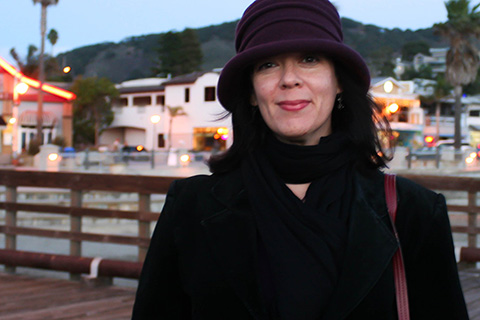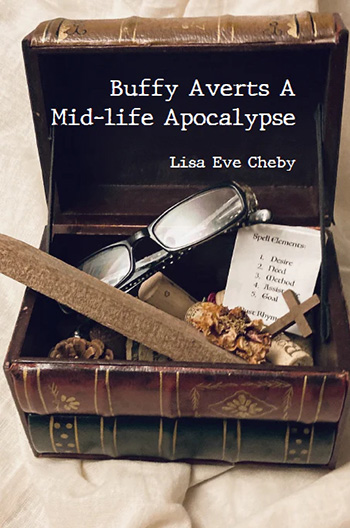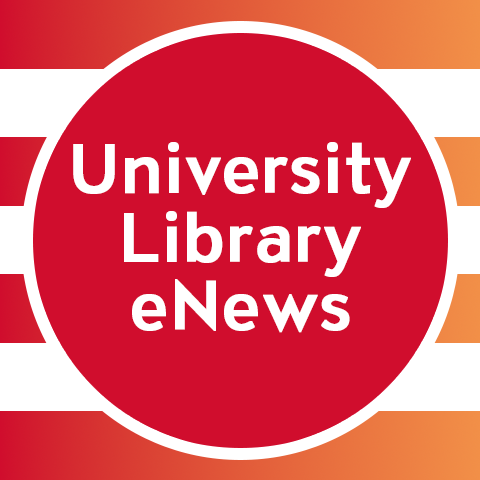Newsletter Edition: Spring 2023
Contributed by Elizabeth Altman
In July 2022, Lisa Cheby joined the Library as the first Dr. Karin J. Duran and Richard Nupoll Education Librarian. In addition to her librarianship, Lisa has worked as a high school English teacher and a poet. She has published two poetry chapbooks, the latest being Buffy Averts a Mid-life Apocalypse. Lisa holds an MLIS from San Jose State University and an MFA from Antioch University. We sat down to talk with her about her experiences.

Your CV tells a story of multiple interests. What brought you to librarianship?
Well, I kind of fell into it. I had taken a year off from teaching to finish my MFA in creative writing, and when I came back to LAUSD (Los Angeles Unified School District), I got a half-time teacher librarian and half-time English teacher position at Daniel Pearl Magnet. The school had funding to start a library, and I really enjoyed putting the library together. That position gave me that insight into this being a possible career. Transitioning to a full-time position as teacher librarian required me to go back to school to get the teacher librarian credential, and I decided to just take the few extra classes and get the MLIS (Master’s in Library and Information Science). And it's really become the place I feel most at home of all my careers.
What do you mean, you feel “most at home”?
I really enjoy teaching and interacting with the students, but I like to have quiet time. Moving to the library at the high school level allowed me to have a little bit more variety: I was able to teach classes that came to the library, but also had time to develop the collection, creating an atmosphere that fosters and supports inquiry and scholarship. The poet part of me likes that creativity. And I'm very interested in social justice issues, and libraries are often on the front line of that. We're constantly considering how information is organized and presented, what is and is not worth preserving. Ultimately, it's a place where people can come and pursue their own questions, and I think all of that is necessary for healthy societal growth and equity.
What do you see as your most important responsibilities as Education Librarian?
I'm still trying to figure out that balance. This is an endowed position, but there’s my role as liaison to the Michael D. Eisner College of Education, and there’s the TCC (Teacher Curriculum Center) and the Fogarty Collection (The Sharon Fogarty Young Readers’ Collection), with its own separate endowment and expectations. I feel a major responsibility is to create an environment where people can feel safe and comfortable finding information and asking for help. I’m also rethinking what current and future teachers need, as so much information is now digital. We have kits for reading comprehension, phonics, storytime, and math, things to bring lessons to life in a classroom. But there are digital versions of those tools that teachers need to have access to, also. So this is the big question, how to support future teachers so they are ready to teach with 21st century technologies.
I also want help teachers really think about what it means to create more diversity, equity and inclusion in their classrooms. We talk about that a lot -- and it's become this “DEI” acronym that we have on a checklist. But we really need to think about how we practice that. The professional development I have in mind for the teachers is built around allowing them to explore: what does DEI look like in the classroom, implemented in an authentic way?
You are a graduate of New College, Florida, which has been much in the news lately. What was it like being a student there?
Going to New College was one of the most transformative decisions I’ve made. I went to Florida State University my first year because I wanted the Big Giant University feel. I remember my A.P. History teacher in high school saying, you should really think about going to New College. But it was really close to home, and it was tiny. And I said, no, I'm going to go to the Big Giant University.
And I get to the Big Giant University, and there were great things about it, but halfway through my first year there, I took this great seminar and I decided I was going to major in English. Well, it was going to take me an extra year to major in English, just because the classes were so full. I was on a scholarship, and my mom was a single mom. Who's going pay for that extra year? I decided to switch to New College where I could finish within the time of my scholarship and really embrace the liberal arts education I craved, and it was a fabulous experience.
New College was small - about 500 students, when I went there – and the classes were seminar style. We had about 15 students in a class, and rather than getting grades, we wrote contracts, in which we’d set goals about what we wanted to accomplish, as a scholar and as a student. For each course we’d receive a page-and-a-half written evaluation. To graduate we had to write an undergraduate thesis, and defend it before a committee. This approach opened a lot of possibility. It gave me the skills to be a lifelong learner, and I think my shifting through so many different careers exemplifies that.
What achievements make you most proud?

Well, I think, just attaining this position. Both my parents are immigrants from Hungary. My father came here in 1956 to escape the revolution and join the US army. My mother came here when she was very young, right after World War II, with her mother. In my family I'm a first-generation college graduate. When I started out as a high school teacher, I never imagined I could become faculty in the library at a university. My mom's biggest advice in high school was “You have to take a typing class,” because that was the skill that would get me a good office job. But now that we use computers for everything, I'm thankful that she did that because it certainly has facilitated my ability to adapt with technology and impress students, when I can look at them and type at the same time. I’m also proud of my poetry books, and this is another accomplishment that when I was younger I never saw examples of in my everyday life. Nobody ever said, you can become a teacher, write, publish a book, become a librarian at a university.
And then there’s my work with the California School Library Association. I'm on their executive board and Vice President of Government Relations. This past year working with our lobbyist, we put together a bill, AB 535, in the California Assembly for school libraries, and to me it’s a big deal. With just a small group of people, we made this happen, and I'm really excited about it.
In addition to having worked as a teacher and now a librarian, you are also a published poet. How did you start writing poetry?
I remember writing a lot of poems on the margins of my notes in my science classes in high school, and I took a few poetry classes in college. I think I always liked writing, but that seemed like something other people were allowed to do -- I didn't feel like I had that permission. But when my mother had a rather prolonged illness, I started writing about that, and interacting with people in virtual writing circles online. I ended up taking a poetry class through UCLA Extension because I wanted a class on craft, and suddenly it felt right to me. When I wanted to go back to school for a master’s degree, I came across the MFA at Antioch University. It was exciting because I felt like that would really reconnect me with my subject area in a new and creative way.
I’ve published two chapbooks and I have another book coming out either this year or next year. It's another chapbook – this one is poems written during the pandemic. It's basically a book-length poetic meditation on the pandemic. Writing it was very healing -- it's one of the things that got me through the pandemic, I think, and so I'm really excited that that's going to be out in the world and to share that with people.
What do you like to do for fun?
Oh, for fun! Well, you know, shockingly, I read the young adult fiction. Right now, I'm reading Bloodmarked, which is the second in the series by Tracy Deonn. The first one is Legendborn, which we just got in the Teacher Curriculum Center. It's a fantasy built on the King Arthur legend and the history of race and racism in the United States and legacies of slavery. The protagonist Briana Matthews, a black student at a university in North Carolina, finds out her family history intertwines the King Arthur legend and legacy of enslavement in the Southern US. Briana must decide how she connects with each, how to wield the power inherited from each, or how to write a new legacy for herself and those after her. So it's really fascinating, with complex and diverse characters and skilled writing.
Also, I do yoga. And I like to go out and do anything related to arts and culture, museums, plays, music, and movies. And of course, like any properly assimilated Angeleno, I enjoy hiking.
